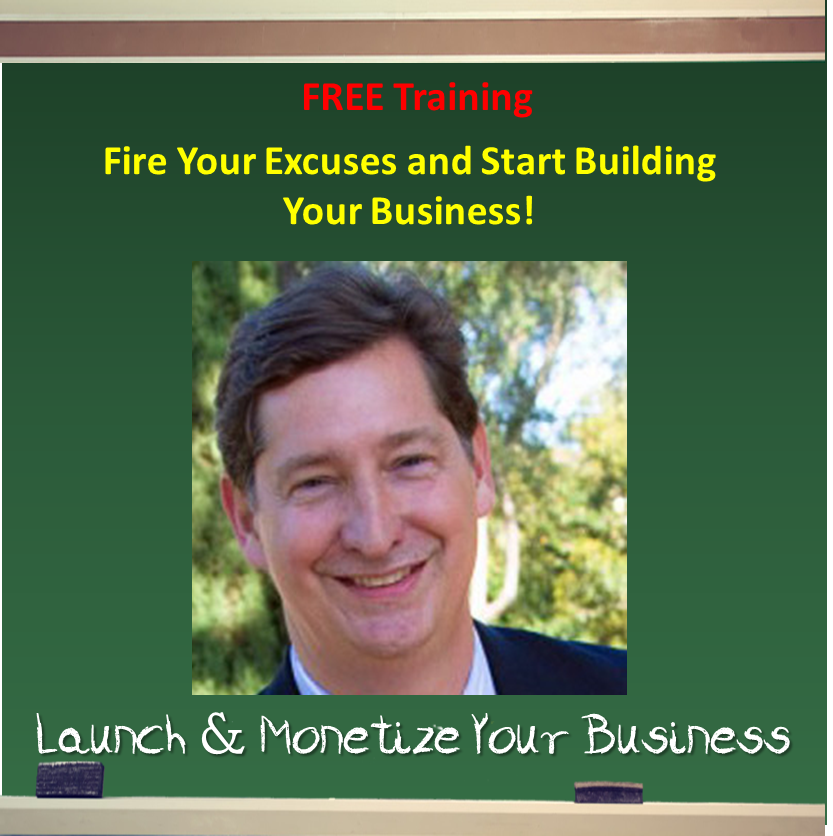Author Archives: Dr. Bill
Free Teleseminar: Fire Your Excuses and Start Building Your Business
Your business is your heart and soul, your income, and your purpose! Make it exactly what you want and dream it to be by getting the latest inspiration, marketing, social media & business trends for FREE! Launch & Monetize Your Business Telesummit March 20-25! http://bit.ly/1hJkcxd Get in on the Free Training Tonight at 9 pm EST!
Title: Dr. Bill Dyment – Fire Your Excuses
Time: Tuesday, March 25th at 9:00pm Eastern/6:00pm Pacific
Listening method: Phone + Web Simulcast
Phone number: (425) 440-5100
PIN Code: 890575#
To attend, visit:
http://InstantTeleseminar.com/
Five Career Mistakes to Stop Making Now
April 21, 2014– Dr. Bill Dyment, Co-Author of Fire Your Excuses
Mistake #1: “Sitting This One Out.” Quick, what was the first year you used a computer in a serious way? If you are currently in the middle of your career, you may have been in your teens or older before you hopped on a keyboard or joystick to work on anything other than your video game score. Marc Prensky called those of us who were not born with a mouse in our hands, “digital immigrants.” We may be quite proficient in all things electronic but it is important to keep in mind that the digital world is our “second language.” In contrast, Prensky’s “digital natives” are those who can’t remember ever not using computers and the Internet to communicate.
While we are all learning new digital platforms; ways of communicating and doing business, digital “immigrants” are especially susceptible to declaring a new site, platform or media avenue, a fad, not-relevant to our industry, or my favorites, “unprofessional” or even “unethical.” This bias makes us vulnerable to being isolated from where the real action is taking place in our industries.
Two years ago, a clinical colleague in his early 30’s praised Psychology Today’s online therapy directory while we were catching up over coffee. I had heard of it but was skeptical. Experience had cynically taught me that most paid directories only served to enrich the publisher and a few featured star performers while the hundreds of other professionals, who received little or nothing in the bargain, paid the bills. Entry was typically steep, billed yearly, and usually yielded only a lighter wallet. Reluctantly, then, I decided to try the directory for a month. I am glad I did. Today 30% of my clinical referrals come from the site. It wasn’t hard to see what was going on, the site was heavily represented by digital natives, less so by digital immigrants. The paradigm was shifting and I was late to the party.
A Challenge: The next time you dismiss a new app, site, platform, or digital trend, pause for a moment to ask, “Am I biased against this new offering because of my “immigration status?” Use wisdom, but test out the new opportunity. Don’t be afraid to be the first among your colleagues to see if it is right for you and anticipate a learning curve.
Mastermind Groups: Are You Missing Out?
February 19, 2014: Dr. Bill Dyment
In May, 2013, I formed a mastermind group of six with the help of my colleague and friend, Trent Adams. It is not an exaggeration to say it was the best business decision made all year. Not only have we dissected each of our businesses in a grueling but highly-rewarding fashion that would make the Shark Tank venture capitalists proud, we have laughed together, challenged, and been there for each other through personal and business changes, crises, and triumphs.
Our rules were fairly simple: Each person committed for three months to meeting for 90 minutes every Wednesday before work and 80% attendance was required, no exceptions. To our delight, it worked and all agreed to continue for at least a year. Today, we routinely turn down requests to join our group as word has gotten around that we have a good thing going. Truly, we all feel as if our investment of time has become an almost unfair business advantage. What’s more, it has been a commitment to myself and my business development, I wish I had implemented years ago. This post is designed to explain a bit more about mastermind groups, in general, to help you decide if joining or starting one is right for you too.
If you haven’t heard much about mastermind groups yet, you will. Thanks, in part, to the praise they have been receiving from some of the top business podcasters, they are springing up everywhere these days. Mastermind groups are usually limited to a maximum of 8-10 people. While not a new phenomenon—Ben Franklin was in a Philadelphia group he called the “junto” (latin for “meeting”) for 37 years, they are experiencing a fresh, 21st century resurgence. Some take place in-person, others are made possible by fast web-based video and cheap phone connections. All are fueled by a growing understanding that collaboration with others is the primary way of succeeding in today’s interdependent marketplace.
This Tuesday, January 14, is National Fire Your Excuse Day! Are you in?
How to celebrate National Fire Your Excuses Day
Honor your resolve to live excuse-free in 2014 by taking one or more of the actions below this Tuesday:
1. Plan…set your written 2014 goals.
2. Connect…join one group that will help you succeed.
3. Move…no after-hours electronics before exercise.
4. Learn…what skill is separating you from your dream?
5. Serve…contact one person or group who needs your support.
Key Principles to Remember This Year:
Refuse to minimize. “Not all excuses are the same, some hinder us, some hurt us, and some kill us.” At the very least, excuses rob us of our dreams, impact and purpose.
“Don’t try harder in 2014, get more connected!” Do you have important goals that have eluded you for years? It’s time to admit that willpower is needed, but it is not enough.
“Everything changes when we walk the last mile of denial.” What is your “last mile?” What two or three actions have you been unwilling to take until now?
Wishing All, Merry Christmas and Happy Holidays!
Business Tip of the Day: “Please Tell Us Why Should We Care”
You are excited about your business. You have a great product or service. But, frankly, why should we care? There are thousands of social media professionals, coaches, consultants, investment professionals and realtors. What makes your business different?
Do you know your most compelling: USP–Unique Service Proposition–that killer benefit that separates you from everyone else? If you do, great! But, you’re not quite finished:
1. Make sure it actually matters to your target customer-ask!
2. Then, make sure your customer knows it.
Does your social network support your success?
We too have seen the powerful influence of one’s closest network as we have worked with individuals wrestling with substance abuse. As a part of our initial assessment, we always ask about the network of people that surround our new clients. It is critical to know who is a part of their circle of influence, with an eye to assessing who may be supporting their drug or alcohol habit. A careful exploration of their social connections invariably reveals those who are negative influencers, e.g., other users, and those who might not be supportive of their recovery efforts. For sobriety to be maintained, our clients need to be firm about their new direction and limit their interactions with those who might sabotage their efforts. Our success truly has much to do with “the company we keep.”
How many do we need in our “inner circle?” Lewis Schiff, author of Business Brilliant, maintains that it is virtually impossible to maintain “close, truly meaningful relationships” with more than six people. He found that the average number of close friends among the “ultra financially successful”-those with a net worth of over $30 million was 4.8 friends. In contrast, those who were in the middle class reported more than nine close friends. His conclusion was that we need to take care to cultivate our core of friends, ideally about six. When we seek to keep up with more than this number, the quality of those closest friendships will suffer.
Consider your own core “social network.” Do you have at least six? Or, do you have too many? It is important to chose your core relationships carefully. Does your network provide you with more positive or negative energy? Would you truly want to become more like your friends? Dan Miller said it best, “You are the average of your six closest friends.” Who are the six most influential people in your life at the moment? How would you rate each one on a scale of 1-10, 10 being most positive? We all have dear friends that are struggling but it is important to make sure that, overall, our social circle is positive, uplifting and challenging. What steps might you take to limit the impact of those who negatively influence you? How does your network need to expanded to include more positive influencers?
We hope you will carefully choose a network that will bring out your best.
Dr. Marcus Dayhoff & Dr. Bill Dyment






